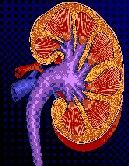Article
Chronic Kidney Disease Prevalent Among Rheumatoid Arthritis Patients
Author(s):
Rheumatoid arthritis patients have a 1-in-4 chance of developing chronic kidney disease, according to research published in the American Journal of Kidney Disease.

Rheumatoid arthritis (RA) patients are more likely to develop chronic kidney disease (CKD) than their healthy counterparts, according to research published in the American Journal of Kidney Disease.
The study, which was conducted by researchers at the Mayo Clinic, also found RA patients were more likely to experience risk factors such as more severe inflammation in the first year of RA, corticosteroid use, high blood pressure, obesity, and dyslipidemia.
The investigators retrospectively examined 813 patients with RA and 813 patients without RA at the Mayo Clinic. Nine percent of the total patient population had reduced kidney function at baseline defined by estimating equations for kidney function, which limited the researchers’ ability to derive associations from their findings.
Nevertheless, the results showed that over 20 years, RA patients had a 1-in-4 chance of developing CKD, compared to the healthy participants’ 1-in-5 risk.
“That might not seem like a lot, but in fact, that’s quite a big difference, and it has important implications for the course of rheumatoid arthritis and for the management of the disease,” lead study author Eric Matteson, MD, said in a press release.
The researchers also noted heart disease was more prevalent among RA patients with CKD. As a result, they advocated for physicians to periodically test RA patients for signs of kidney problems through blood and urine analyses, as well as encourage patients to keep their blood pressure in check, avoid a high-salt diet, and eliminate or reduce kidney-damaging medications.
“Kidney disease in patients with RA can be detected very simply, and the techniques are the same as are used in the general population,” Matteson said.

